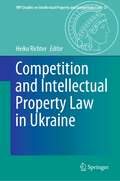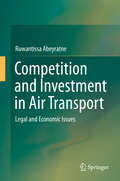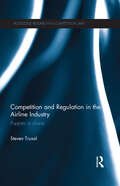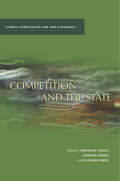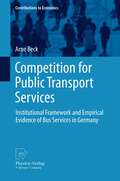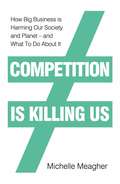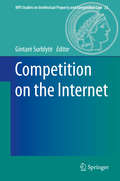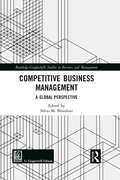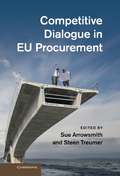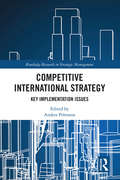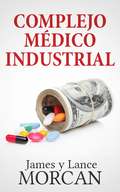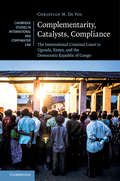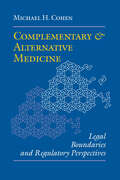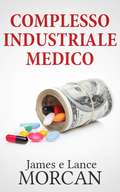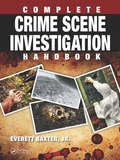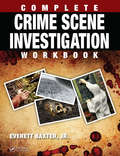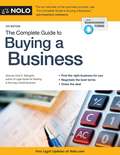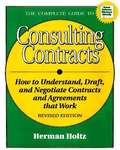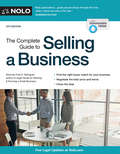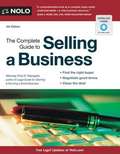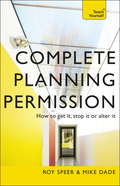- Table View
- List View
Competition and Intellectual Property Law in Ukraine (MPI Studies on Intellectual Property and Competition Law #31)
by Heiko RichterThis volume provides the most comprehensive contemporary academic writing on Ukrainian competition and intellectual property law in English. Especially over the last few years, these areas have been in considerable flux, a main driver being the EU–Ukraine Association Agreement. The chapters cover a broad range of different topics and share a forward-looking perspective. They also outline the basic background that is necessary to understand the context of the issue discussed, especially with regards to the legal system of Ukraine. The publication is the result of a two-year project, and it is addressed to a wide range of international scholars, practitioners, and policy makers. It aims to make the state-of-the-art in Ukrainian legal scholarship visible and accessible to the international research community and to stimulate global debates in academia and politics. Therefore, it may be of interest and use to anyone who is interested in competition and intellectual property law, and/or in Ukraine.
Competition and Investment in Air Transport: Legal and Economic Issues
by Ruwantissa AbeyratneThis book addresses emerging legal and economic issues in competition and investment in air transport, against the backdrop of the role governments and airlines should play in avoiding protectionism and encouraging innovation and creativity. It evaluates current trends in air transport and the direction the industry is taking in the twenty first century. There are discussions on key aspects of air transport, such as safety assurance and environmental protection, as they are impacted by competition. The rapid evolution of aerospace transport and its effect on competition in air transport is also examined. A recurring theme of the book is the influence of creative destruction and disruptive innovation on air transport. This is addressed through an in-depth study of the contentious areas of law relating to the abuse of dominant positions and state aid, as reflected in the ongoing claim by the three largest US carriers against Gulf carriers such as Emirates Airlines, Etihad and Qatar Airways. The US carriers claim that Emirates and Etihad - which operate air services into the United States by virtue of an open-skies agreement between the US and The United Arab Emirates - are using generous subsidies given to them by their g overnments to illegally capture the "legitimate" market belonging to the US carriers. These issues are clarified in the book using analyses of competition law and investment law as they apply to air transport, free-trade-agreement analogies and an open-skies case study.
Competition and Regulation in the Airline Industry: Puppets in Chaos (Routledge Research in Competition Law)
by Steven TruxalAn examination of the relationship between competition and the deregulation and liberalisation of the US and European air transport sectors reveals that the structure of the air transport sector has undergone a number of significant changes. A growing number of airlines are entering into horizontal and vertical cooperative arrangements and integration including franchising, codeshare agreements, alliances, ‘virtual mergers’ and in some cases, mergers with other airlines, groups of airlines or other complementary lines of business such as airports. This book considers the current legal issues affecting the air transport sector incorporating recent developments in the industry, including the end of certain exemptions from EU competition rules, the effect of the EU-US Open Skies Agreement, the accession of new EU Member States and the Lisbon Treaty. The book explores the differing European and US regulatory approaches to the changes in the industry and examines how airlines have remained economically efficient in what is perceived as a complex and confused regulatory environment. Competition and Regulation in the Airline Industry will be of particular interest to academics and students of competition law as well as EU law.
Competition and the State
by Ioannis Lianos D. Daniel Sokol Thomas K. ChengCompetition and the State analyzes the role of the state across a number of dimensions as it relates to competition law and policy across a number of dimensions. This book re-conceptualizes the interaction between competition law and government activities in light of the profound transformation of the conception of state action in recent years by looking to the challenges of privatization, new public management, and public-private partnerships. It then asks whether there is a substantive legal framework that might be put in place to address competition issues as they relate to the role of the state. Various chapters also provide case studies of national experiences. The volume also examines one of the most highly controversial policy issues within the competition and regulatory sphere#151;the role of competition law and policy in the financial sector. This book, the third in the Global Competition Law and Economics series, provides a number of viewpoints of what competition law and policy mean both in theory and practice in a development context.
Competition and the State
by Ioannis Lianos D. Daniel Sokol Thomas K. ChengCompetition and the State analyzes the role of the state across a number of dimensions as it relates to competition law and policy across a number of dimensions. This book re-conceptualizes the interaction between competition law and government activities in light of the profound transformation of the conception of state action in recent years by looking to the challenges of privatization, new public management, and public-private partnerships. It then asks whether there is a substantive legal framework that might be put in place to address competition issues as they relate to the role of the state. Various chapters also provide case studies of national experiences. The volume also examines one of the most highly controversial policy issues within the competition and regulatory sphere#151;the role of competition law and policy in the financial sector. This book, the third in the Global Competition Law and Economics series, provides a number of viewpoints of what competition law and policy mean both in theory and practice in a development context.
Competition for Public Transport Services: Institutional Framework and Empirical Evidence of Bus Services in Germany (Contributions to Economics)
by Arne BeckThis book evaluates the successes, failures, and factors that influence the competition for public bus transport services. Using Germany as a case study, the author explains the dichotomous system of a market with licenses for commercial services, where operators are granted exclusivity, and licenses for non-commercial services, where supplementary direct subsidies are tendered out by public transport authorities. The empirical analysis is based on primary data usually not publicly available, and supplemented by numerous expert interviews. The book aims to provide a basic understanding of the players and their options, offer insights into the German model, and make policy recommendations for those whose goal is to increase competition.
Competition is Killing Us: How Big Business is Harming Our Society and Planet - and What To Do About It
by Michelle MeagherWe live in the age of big companies where rising levels of power are concentrated in the hands of a few. Yet no government or organisation has the power to regulate these titans and hold them to account. We need big companies to share their power and we, the people of the world, need to reclaim it. In Competition is Killing Us, top business and competition lawyer Michelle Meagher establishes a new framework to control capitalism from the inside in order to make it work for the many and not just the few. Meagher has spent years campaigning against these multi-billion and trillion dollar mammoths that dominate the market and prioritise shareholder profits over all else; leading to extreme wealth inequality, inhumane conditions for workers and relentless pressure on the environment.In this revolutionary book, she introduces her wholly-achievable alternative; a fair and comprehensive competition law that limits unfair mergers, enforces accountability and redistributes power through stakeholder governance.
Competition on the Internet (MPI Studies on Intellectual Property and Competition Law #23)
by Gintarė SurblytėUndeniably widespread and powerful as it is, the Internet is not almighty: it can reach as high as the skies (cloud computing), but it cannot escape competition. Yet, safeguarding competition in "the network of networks" is not without challenges: not only are competitive processes in platform-based industries complex, so is competition law analysis. The latter is often challenged by the difficulties in predicting the outcome of competition, in particular in terms of innovation. Do the specific competition law issues in a digital environment presuppose a reconsideration of competition law concepts and their application? Can current competition law tools be adjusted to the rush pace of dynamic industries? To what extent could competition law be supplemented by regulation - is the latter a foe or rather an ally? This book provides an analysis of recent developments in the most relevant competition law cases in a digital environment on both sides of the Atlantic (the EU and the US) and assesses platform competition issues from a legal as well as an economic point of view.
Competitive Business Management: A Global Perspective (Routledge-Giappichelli Studies in Business and Management)
by Silvio M. BrondoniThe growth of global corporations has led to the development of new business strategies whose complexity and configuration rest on corporate networks; corporate cross-culture and intangible corporate and product assets. In global markets, corporations compete in a competitive marketspace dimension, in other words, competitive boundaries in which space is not a stable element of the decision-making process, but a competitive factor whose complexity depends on markets increasingly characterized by time-based competition and over-supply. In view of today's fierce competition from US and Southeast Asian corporations, this book highlights global business development policies based on innovation, sustainability and intangible assets. The book assesses competitive business management from a global perspective, examining business development policies linked to the profitability of global firms. It forces readers to actively think through the most fundamental policies developed by global firms in the current competitive landscape and provides answers to questions such as: What are the new drivers of global capitalism?; How do global businesses deal with new local nationalism?; Which governance systems and behavioural norms qualify global businesses?; What are the main business policies that characterize competitive business management in a global competition perspective? Competitive Business Management neatly explains the global business management domain and helps readers to gain an understanding of global development business policies.
Competitive Dialogue in Eu Procurement
by Sue Arrowsmith Steen TreumerCompetitive dialogue is a procedure introduced into the EU procurement system in 2004 to provide an improved method for awarding complex contracts, such as those for public infrastructure and major IT systems. This book provides a critical examination of the legal rules on this new procedure, focusing in particular on grey areas such as availability of the procedure and the scope for negotiations after 'final tenders'. It considers both the EU-level rules and the way in which those rules have been applied in national systems. The examination draws on extensive evidence of the way in which the procedure has been operated and interpreted across Europe, including from several studies commissioned specifically for this volume. It also includes an extensive chapter co-authored by the volume editors which provides a thorough analysis of the EU-level rules, a comparative reflection on national experiences and significant critical commentary and recommendations.
Competitive International Strategy: Key Implementation Issues (Routledge Research in Strategic Management)
by Anders PehrssonContemporary businesses are exposed to global competition enhanced by new information technology and liberalized cross-border transactions in many industries. This introduces a new competitive dynamic, influenced by actors in developed and emerging markets. The dynamic puts major demands on executives as they consider future moves that support strategic initiatives. The context of intensified global competition requires attention from practicing (and aspiring) leaders in international business organizations. Drawing on contemporary research, Competitive International Strategy: Key Implementation Issues addresses international business strategy formulation and implementation in the global competitive market. It captures the essential strategy components by elaborating on the implementation of corporate integration and local responsiveness. This is considered a vital dichotomy in the development of international business strategies. Essential components include competition context, firm’s resources, strategy directions and competence, implementation issues, and competitiveness. The book includes several detailed company cases. Bridging the strategy formulation and implementation is crucial for the ultimate success of international business firms. This book will be of great value to students at an advanced level, academics, and reflective practitioners in the fields of strategic management, leadership, and international business.
Complejo Médico Industrial
by David Arieta Galván James Morcan Lance MorcanComplejo Médico Industrial no es una crítica sin restricciones de la medicina convencional y los diferentes actores que componen una de las más grandes y rentables industria en el planeta. Incluyendo un prólogo por parte del farmacéutico retirado Denis Toovey (autor de Better Health for You: An Insider’s Big Picture Guide), este explosivo libro explora la discusión de que las Grandes Farmacéuticas y otros participantes en el sector del cuidado de la salud ponen las ganancias por delante del bienestar de los pacientes y los dólares antes que las vidas. Complejo Médico Industrial no deja duda de que algo malo ha sucedido en el campo médico y lo que debe ser la profesión más noble ha estado severamente comprometida por varios conflictos de interés. Los autores examinan esto en un lenguaje que cualquiera puede entender. En el proceso, hacen notar el desenfrenado mercantilismo, el egoísmo político y la academia dogmática que plaga a la industria. Se le recuerda al lector que existe mucha gente honorable en el negocio médico que está haciendo cosas increíbles por sus semejantes. Sin embargo, también se le recuerda que médicos, hospitales, la academia médica, las compañías farmacéuticas, los proveedores de equipo médico, aseguradoras y otros hacen su dinero de gente enferma, no saludable, y si todo el mundo estuviera sano muchos de los arriba mencionados estarían fuera del negocio… por lo que no está en sus intereses financieros curar enfermedades y males. Complejo Médico Industrial hace algunas fuertes preguntas. Como: ¿Es tu médico uno de esos que recibe sobornos de compañías farmacéuticas? ¿Qué tan peligrosos son nuestros hospitales para los pacientes? ¿Las compañías farmacéuticas hacen medicamentos o dinero? ¿Es inteligente que los padres vacunen a sus hijos? ¿Conoces las pruebas médicas que pueden matarte? ¿Las curas están siendo realmente ocultas? ¿Cuándo fue la última vez que tu méd
Complementarity in the Line of Fire
by Sarah M. H. NouwenOf the many expectations attending the creation of the first permanent International Criminal Court, the greatest has been that the principle of complementarity would catalyse national investigations and prosecutions of conflict-related crimes and lead to the reform of domestic justice systems. Sarah Nouwen explores whether complementarity has had such an effect in two states subject to ICC intervention: Uganda and Sudan. Drawing on extensive empirical research and combining law, legal anthropology and political economy, she unveils several effects and outlines the catalysts for them. However, she also reveals that one widely anticipated effect – an increase in domestic proceedings for conflict-related crimes – has barely occurred. This finding leads to the unravelling of paradoxes that go right to the heart of the functioning of an idealistic Court in a world of real constraints.
Complementarity, Catalysts, Compliance: The International Criminal Court in Uganda, Kenya, and the Democratic Republic of Congo (Cambridge Studies in International and Comparative Law #147)
by Christian M. De VosSince its establishment at the turn of the century, a central preoccupation of the International Criminal Court (ICC) has been to catalyse the pursuit of criminal accountability at the domestic level. Drawing on ten years of research, this book theorizes the ICC's principle of complementarity as a transnational site and adaptive strategy for realizing an array of ambitious governance goals. Through a grounded, inter-disciplinary approach, it illustrates how complementarity came to be framed as a “catalyst for compliance” and its unexpected effects on the legal frameworks and institutions of three different ICC “situation countries” in Africa: Uganda, Kenya, and the Democratic Republic of Congo. Linking complementarity's law and practice to contemporary debates in international law and relations, the book unsettles international law's dominant progressive narrative. It urges a critical rethinking of the ICC's politics and a reorientation towards international criminal justice as a project of global legal pluralism.
Complementary and Alternative Medicine: Legal Boundaries and Regulatory Perspectives
by Michael H. CohenExplores the legal issues that health care providers, institutions, and regulators confront as they contemplate integrating complementary and alternative medicine into mainstream U.S. health care. A third of all Americans use complementary and alternative medicine—including chiropractic, acupuncture, homeopathy, naturopathy, nutritional and herbal treatments, and massage therapy—even when their insurance does not cover it and they have to pay for such treatments themselves. Nearly a third of U.S. medical schools offer courses on complementary and alternative therapies. Congress has created an Office of Alternative Medicine within the National Institutes of Health, and federal and state lawmakers have introduced legislation authorizing widespread use of such therapies. These institutional and legislative developments, argues Michael H. Cohen, express a paradigm shift to a broader, more inclusive vision of health care than conventional medicine admits. Cohen explores the legal issues that health care providers (both conventional and alternative), institutions, and regulators confront as they contemplate integrating complementary and alternative medicine into mainstream U.S. health care. Challenging traditional ways of thinking about health, disease, and the role of law in regulating health, Cohen begins by defining complementary and alternative medicine and then places the regulation of orthodox and alternative health care in historical context. He next examines the legal ramifications of complementary and alternative medicine, including state medical licensing laws, legislative limitations on authorized practice, malpractice liability, food and drug laws, professional disciplinary issues, and third-party reimbursement. The final chapter provides a framework for thinking about the possible evolution of the regulatory structure. This book is the first to set forth the emerging moral and legal authority on which the safe and effective practice of alternative health care can rest. It further suggests how regulatory structures might develop to support a comprehensive, holistic, and balanced approach to health, one that permits integration of orthodox medicine with complementary and alternative medicine, while continuing to protect patients from fraudulent and dangerous treatments.
Complesso Industriale Medico
by James Morcan Lance Morcan A. IngenitoQuesta è una ricerca, articolata e fedele, della verità sul sistema che collega servizi sanitari, industrie farmaceutiche, ambienti medici universitari, assicurazioni e ricerche mediche innovative, in cui i Morcan propongono un esauriente compendio sulle logiche sociali e di mercato che guidano la medicina moderna, citando alcuni importanti esperti dei diversi settori. Così i capitoli si susseguono, facendo eco sia ai sostenitori che ai detrattori della ricchissima industria della salute, cercando di comunicare al lettore l'unica cosa veramente importante, ossia che le giuste informazioni possono aiutarci sul serio a capire come curarci e a guarire. Farmaci tradizionali o alternativi, di sintesi o naturali, tutti hanno i loro pro e contro ma, qualora se ne conosca il vero potenziale, costituiscono un potenziamento del nostro armamentario terapeutico. Seppure molti di noi, soprattutto in occidente, sono il riflesso di un'umanità che subisce passivamente cure inefficaci e trattamenti pericolosi solo in nome del denaro, la verità è che risulta molto più sano e gratificante conoscere se stessi, mente e corpo, e scegliere quale strada seguire per arrivare alla guarigione.
Complete Crime Scene Investigation Handbook
by Everett Baxter Jr.Crime scene investigators are the foundation for every criminal investigation. The admissibility and persuasiveness of evidence in court, and in turn, the success of a case, is largely dependent upon the evidence being properly collected, recorded, and handled for future analysis by investigators and forensic analysts in the lab. Complete Crime Sce
Complete Crime Scene Investigation Workbook
by Everett Baxter Jr.This specially developed workbook can be used in conjunction with the Complete Crime Scene Investigation Handbook (ISBN: 978-1-4987-0144-0) in group training environments, or for individuals looking for independent, step-by-step self-study guide. It presents an abridged version of the Handbook, supplying both students and professionals with the mos
Complete Family Wealth: Wealth as Well-Being (Bloomberg Ser.)
by James E. Hughes Jr. Susan E. Massenzio Keith WhitakerA primer for families of high net worth on how to manage their qualitative and financial wealth for generations The second edition of this foundational work, Complete Family Wealth: Wealth as Well-Being provides proven tools and best practices for families of means to use in maturing, maintaining, and managing personal and legacy wealth long into the future. The book is divided into three parts: the "what"—what is meant by family, wealth, and enterprise; the "who"—the persons crucial to family enterprise flourishing; and the "how"—specific practices families can use to enhance and grow family wealth. The second edition of this work places the health and well-being of the individual members of the family unit at the forefront of every aspect detailed within the book. A natural product of this focus is an increased awareness of the social complexities of wealth that have come to the fore in recent years, and the team of expert authors here address the responsibility of private wealth to the public good. In addition, Complete Family Wealth's second edition provides readers with: A new chapter on "the big reveal," suggesting ways to encourage positive, life-affirming reception of the revelation of present or future wealth An additional chapter on preserving the beloved family vacation home Two new appendices: "Fiduciary Course Curriculum," dedicated to enhancing the education of trustees and beneficiaries; and "Key Practices for Families During Challenging Times," a response to the pandemic but relevant to all trying periods for families Examples that make these practices accessible to a broad audience across the wealth spectrum. Having shaped the language used by families and their advisors with the first edition, Complete Family Wealth's second edition is essential reading for families of high net worth and their financial advisors. It will also be of interest to family offices, fund managers, as well as private investors.
Complete Guide to Buying a Business, The
by Fred S. SteingoldA perfect guide for entrepreneurs Whether you just want an overview of the business buying process or you're ready to acquire an existing business, you know you'll need to finance, negotiate and structure the deal and protect yourself from unpleasant surprises. The Complete Guide to Buying a Business will give you everything you need to know including more than two dozen crucial forms and legal documents to help you do it. You'll learn how to: find the right business analyze the seller's numbers make sense of the tax issues avoid outstanding liens and liabilities prepare and sign a sales agreement close the deal prevent the seller from competing against you work with lawyers, accountants and brokers The 4th edition of The Complete Guide to Buying a Business is completely updated to reflect the latest laws and tax information.
Complete Guide to Consulting Contracts
by Herman HoltzIn this new edition with the forms on disk, The Complete Guide to Consulting offers legal, binding, and enforceable agreements at the click of a button. Readers can use the built-in software or pull the forms up into popular word-processing packages. Either way, consultants can use more than 40 model agreements and clauses to customize forms.
Complete Guide to Selling a Business, The
by Fred S. SteingoldThe most comprehensive, easy-to-use guide to selling a business available! Out there somewhere is a buyer looking to buy a business like yours -- so if you're ready to sell, make sure that you protect your interests and maximize your profit with The Complete Guide to Selling a Business. It covers: getting your business ready to sell pricing your business and valuing your assets finding the right buyer analyzing the tax issues negotiating a payment plan and other terms of sale planning your future relationship with the business limiting your liability working with lawyers, accountants and brokers closing the deal and transferring the business to its new owner The Complete Guide to Selling a Business helps you create more than two dozen crucial documents for both asset and entity sales, including: the sales agreement confidentiality letter promissory notes and security agreements noncompete and consulting agreements closing checklists This edition edition is completely updated with the latest tax considerations, and now provides more advice on marketing the sale of your business. There are literally dozens of competing titles on the market, but none can match The Complete Guide to Selling a Business for sheer depth, accuracy and ease of use.
Complete Guide to Selling a Business, The
by Fred S. Steingold AttorneyThe most comprehensive, easy-to-use guide to selling a business available! It covers: getting your business ready to sell pricing your business and valuing your assets finding the right buyer analyzing the tax issues negotiating a payment plan and other terms of sale planning your future relationship with the business limiting your liability working with lawyers, accountants and brokers closing the deal and transferring the business to its new owner The Complete Guide to Selling a Business helps you create more than two dozen crucial documents for both asset and entity sales, including: the sales agreement confidentiality letter promissory notes and security agreements noncompete and consulting agreements closing checklists This edition is completely updated with the latest tax considerations, and now provides more advice on marketing the sale of your business. There are literally dozens of competing titles on the market, but none can match The Complete Guide to Selling a Business for sheer depth, accuracy and ease of use. Download forms for book on nolo.com
Complete IEP Guide, The: How to Advocate for Your Special Ed Child
by Lawrence M. SiegelRecipient of the 2017 BRONZE Winner for Education Award from Foreword Indies. Get the educational services and support your child deserves Federal law guarantees every child a free appropriate education, and the goal of the Individualized Education Program (IEP) is to assure that every child with special needs receives what the law promises. But if you have a special ed child, you know that your family must make sure the school follows through. This powerful book covers: eligibility rules and assessments working with outside experts developing your child's ideal educational program preparing for and attending IEP meetings, and resolving disputes with school districts. The 10th edition includes summaries of important court decisions, expanded information on independent evaluations and bullying, and additional real-life tips. It provides key forms, sample letters, and resources you need at every stage of the IEP process. With it, you can make sure your child gets a good education—the education he or she deserves. With downloadable forms, letters and resources inside. Includes IEP blueprint.
Complete Planning Permission: How to get it, stop it or alter it
by Roy Speer Mike DadeThe UK Planning Regulations are a minefield for anyone looking to build a new home - and for those who are worried about the impact of a new planning application near their home. Avoid being one of the thousands whose application is turned down - and whose dreams are crushed - by using this book to familiaries yourself with the system and beat it. With a step-by-step guide to every part of the application process and ehaustive coverage of the do's and don'ts this is an essential guide to securing that first step on the path to building your dream home. And if you're worried about a nearby development there are easily implimented strategies for preventing planning permission from being granted. From one of the UK's leading planning consultancies with the very latest on all the new and recent changes to planning law this is the most comprehensive guide avaliable to manipulating the intricacies of this difficult and controversial area.
